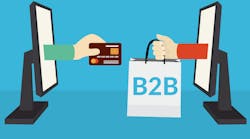“We have only begun to see the impact of the Internet,” said Michael Treacy, president and founder of Treacy & Co. and author of Double Digit Growth, speaking at a recent event I attended. “We are at the dawn of a revolution of how businesses do business with other businesses,” he added. Internet 2.0 was a business to consumer revolution, but “Internet 3.0 is at our doorstep and that will be a business to business revolution.”
He admits that the transformation will not be as easy as what Amazon did to retail sales, but it is going to have the same effect. “B2B selling is more complicated, but we are headed toward an Amazon world in the B2B environment.”
He believes businesses will see the digital transformation in a number of ways. One will be in the improvement of internal existing processes, which will result in cost reductions and an increase in the speed of responses. He also expects to see next generation operating modes where businesses create breakthrough value propositions and develop direct relationships with customers. “You will direct ship more product to customers but in some cases will outsource the service.”
He also sees the development of electronic marketplaces, which have a lot of customers and sellers in one place. These marketplaces will require seamless connections.
Treacy challenged the audience by asking: “What is your plan for shifting to process improvement and for shifting customers to self-service?”
He said that today self-service transactions are about 5% of all transactions but that will move to 95% in the future. In areas where consultation is required, there will be a shift to a self-service model.
Speaking specifically about the truck parts business, Treacy said: “There are parts everywhere in the system. Inventory is everywhere but there is limited visibility to it. There is a huge consolidation play here and there will be losers.”
Treacy says there is too much “noise and motion and shouting that amounts to nothing in the B2B arena. The hardest part (of the transformation) is to let go of complex policies within organizations.” He encouraged audience members to look for ways to narrow their purchasing policies to make themselves easier to do business with.
Some of what the internet will bring to B2B still remains to be seen, but in the meantime, you need to work to simplify our processes. This will not only help prepare you for what’s to come but add efficiency back into your processes today.



